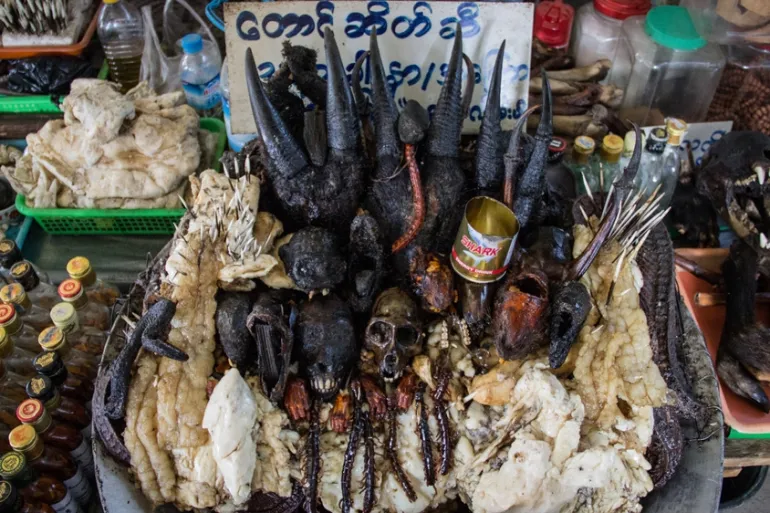Myanmar’s forests are home to some of the most Magnificient Apex predators and Keystone species, such as the Tiger, Leopard, Elephants, and Bears, but due to incessant pressure of poaching of these animals for their Tusks, Bones, Bile, and other things, they have virtually become non-existent in the forests. The trade is driven by the demand for such wildlife products in China and Southeast Asian Countries where superstitions and beliefs are held in high regard over modern scientific medicine. The Poaching of Apex Predators in Myanmar has had negative consequences for the country in some forests Tigers have become non-existent which led to the rapid growth of the herbivore population leading to the collapse of the forest ecosystem and degraded forests now stand in the place of pristine forest which once stood there.
A Tiger is caught on a Camera trap in Sagaig region’s Tamanthi Wildlife Reserve./ WCS-Myanmar
Due to the degradation of forests as a result of prey population outbursts after some time food sources for the prey population dried up leading to a mass die-off of the prey population or them venturing into human-dominated spaces where they were hunted for food and for the trade as well, this absence of the prey population led to the predators to venture into Human landscape in search of food which bought them into direct conflict with humans as they would prey on the cattle which is the main livelihood for communities living around the forest, this conflict proved to be detrimental to the predator population as they were nearly hunted to extinction locally to supply the demand for wildlife products in China and neighboring countries. Often many people are hesitant to call out such action or condemn and take action against such people as corruption is rampant and the thought of being vilified by a certain group of society for being intolerant towards foreign culture is not worth the risk of saving a magnificent species in these parts of the world.
The Impact of IWT
The Illegal Wildlife trade is having a devastating impact on the predator population of Myanmar which directly/indirectly affects the ecosystem as a whole which in turn affects the local communities living in and around the forest leading them into deeper poverty and pushing them to do other illegal activities such as Drug running. Criminal syndicates usually want such communities to stay poor so that they can exploit them to get the wildlife products they need for lower prices. The collapse of the ecosystem which resulted in the degradation of the forest also led to a decrease in the forest harvest which the local communities relied on to a certain extent for their livelihoods are now pushed deeper into poverty and exploited even more and recruited into rebel groups promising stability and prosperity, criminal syndicates and drug smuggling gangs promising money to feed their families, hence it is evident that biodiversity is directly linked to the local economies and the overall economic prosperity of the country in question, many countries are caught up in the hyper-capitalism storm where money and development is given preference over the environment leading to loss of money in the long run.
The poaching of apex predators is a threat to the biodiversity of Myanmar and also a threat to the community whose livelihood is dependent on the forest. Many International and local organizations are at the forefront of Wildlife conservation in Myanmar such as
WWF-World Wildlife Fund is an international organization which funds various conservation projects in collaboration with the local organization working to save the biodiversity of Myanmar
The same is being done by the Wildlife Conservation Society (WCS), the Freeland Foundation, and The Environmental Investigation Agency (EIA), these societies and organizations work in conjunction with the government and the local communities to provide awareness regarding the problem, educate, carry out research, provide training to the law enforcement and in some cases are even pivotal in drafting strict anti-poaching laws to deter poaching. The common people have a big part to play in this global quest for saving not only the wildlife of Myanmar but also the Global Wildlife population by rejecting superstitious and false beliefs based on empirical and hearsay evidence rather than concrete scientific evidence, promoting such products, consuming, etc. The problem of IWT is a complex one and cannot be solved with just a single solution it needs to be multidisciplined and should be collaborative.
